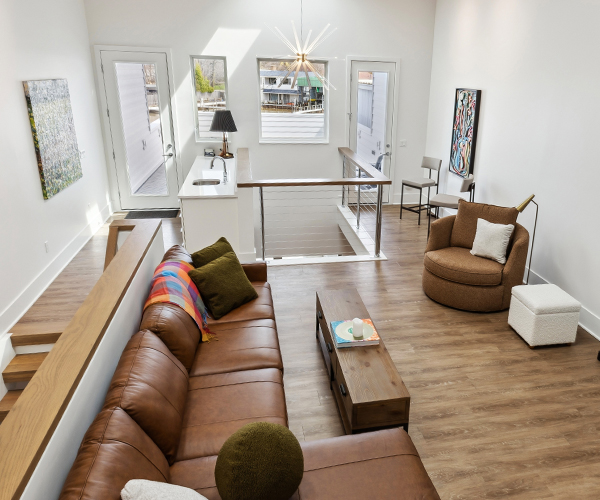One of the most important factors in your home purchase is your credit. It can help you decide how much house you can afford, which sets guidelines for narrowing your search. That’s why you must investigate your credit history and score before you start the home-buying process.
If you’re a first-time homebuyer, it’s a good idea to equip yourself with as much information about your own credit as possible. If you have had financial stumbles in the past, knowing what you’re up against and where you stand will make you more confident. Your loan officer will closely investigate your credit history and score before offering you a loan amount and interest rate.
If you’re a first-time homebuyer, it’s a good idea to equip yourself with as much information about your own credit as possible. If you have had financial stumbles in the past, knowing what you’re up against and where you stand will make you more confident. Your loan officer will closely investigate your credit history and score before offering you a loan amount and interest rate.
Credit scores and interest rates
“The higher your credit score, the better deal we’ll be able to make for you,” says Monica Martines, spokesperson for Third Federal Savings. The best deals are available for homebuyers in the “700 club,” she says. She also adds that interest rates and loan packages vary from lender to lender, so it pays to shop around a little bit. Include savings and loans, not just banks, in your loan shopping — Martines points out that those types of financial institutions are doing a lot with mortgages.
Once you find a loan officer you like with a deal that makes you happy, you can use that person as a financial advisor during your home search. “At Third Federal, we counsel our clients to help them make the right choice. We are prepared to redirect clients if they are looking to buy a home in a price range that’s too high for them,” says Martines. “The idea is to help our clients be successful homeowners.”
Once you find a loan officer you like with a deal that makes you happy, you can use that person as a financial advisor during your home search. “At Third Federal, we counsel our clients to help them make the right choice. We are prepared to redirect clients if they are looking to buy a home in a price range that’s too high for them,” says Martines. “The idea is to help our clients be successful homeowners.”
Credit repair
Good credit is essential to getting a good rate on a loan. But if you have some credit mistakes in your past, don’t despair: It can be repaired. Just know that it can take a little time (usually a couple of months) to get it back on track. So get this step completed before you start shopping for a loan — it can make the difference between a low interest rate and a high one, which will directly affect your monthly mortgage payment. “Good credit also helps keep you away from loans that are questionable or ‘creative,’ ” says Martines, which are exactly the kind of loans that got the economy into trouble.
Needing to repair a little bad credit is not that unusual, so don’t be embarrassed. “Often, people start getting into credit problems in college and need to work now to pay down debt and raise their scores,” she says. She suggests that potential homebuyers pay down car debt and revolving credit cards before moving on to the next step.
Needing to repair a little bad credit is not that unusual, so don’t be embarrassed. “Often, people start getting into credit problems in college and need to work now to pay down debt and raise their scores,” she says. She suggests that potential homebuyers pay down car debt and revolving credit cards before moving on to the next step.
Money down
Certainly, the larger the down payment you can save, the better off you will be securing a good interest rate, having a low monthly payment and getting speedy approval for a loan. But even if you are unable to plunk down 20 percent in cash, there are still options available for loans with good rates.
“Even with just 5 percent down, you can still qualify for a 30-year, fixed, conventional financing at a good interest rate,” says Martines. “That is one of the safest, no-surprise loans out there.” But she adds that saving for a larger down payment can eliminate the need to pay Private Mortgage Insurance (PMI), a monthly fee that does not apply to your principal. “If you can avoid paying PMI, do.”
“Even with just 5 percent down, you can still qualify for a 30-year, fixed, conventional financing at a good interest rate,” says Martines. “That is one of the safest, no-surprise loans out there.” But she adds that saving for a larger down payment can eliminate the need to pay Private Mortgage Insurance (PMI), a monthly fee that does not apply to your principal. “If you can avoid paying PMI, do.”
Loan options
Matt Koch, National City’s vice president of mortgage lending, Cleveland (now part of PNC), does have good news for the low down-payment crowd. A couple of very reputable programs exist through the Federal Housing Administration (FHA), Veteran’s Administration and USDA Rural Development that allow a low down payment and a great rate. He says that with FHA, the down payment can be as low as 3.5 percent. And with the Veteran’s and Rural Development programs, it can even be as low as 0 percent.
This opens up a lot of opportunity for qualified buyers with little or nothing saved in advance. “These mortgages are considered mainstream mortgages,” he says, adding that they’re all available from National City and other well-known banks. If you don’t qualify for one of the special programs, check into a conventional loan for just a little more money down, usually at least 5 percent.
Koch stresses the best thing for a first-time homebuyer to do is work with a skilled loan officer who can find the right program. “And don’t be afraid to ask lots of questions,” he adds. “Make sure you understand the loan and all of its terms before you enter into any agreement.”
The market is perfect for first-time homebuyers right now — lots of housing inventory, low interest rates and good programs all add up to a buyer’s market. Find a professional loan officer you trust, get your credit together, save some money, and ask lots of questions. Soon, you can be in the starter home of your dreams. nAll About CreditFind what you need to secure a good mortgage.by Karen Fuller“Even with just 5 percent down, you can still qualify for a 30-year, fixed, conventional financing at a good interest rate. That is one of the safest, no-surprise loans out there.”
Monica Martines, spokesperson for Third Federal Savings
This opens up a lot of opportunity for qualified buyers with little or nothing saved in advance. “These mortgages are considered mainstream mortgages,” he says, adding that they’re all available from National City and other well-known banks. If you don’t qualify for one of the special programs, check into a conventional loan for just a little more money down, usually at least 5 percent.
Koch stresses the best thing for a first-time homebuyer to do is work with a skilled loan officer who can find the right program. “And don’t be afraid to ask lots of questions,” he adds. “Make sure you understand the loan and all of its terms before you enter into any agreement.”
The market is perfect for first-time homebuyers right now — lots of housing inventory, low interest rates and good programs all add up to a buyer’s market. Find a professional loan officer you trust, get your credit together, save some money, and ask lots of questions. Soon, you can be in the starter home of your dreams. nAll About CreditFind what you need to secure a good mortgage.by Karen Fuller“Even with just 5 percent down, you can still qualify for a 30-year, fixed, conventional financing at a good interest rate. That is one of the safest, no-surprise loans out there.”
Monica Martines, spokesperson for Third Federal Savings



